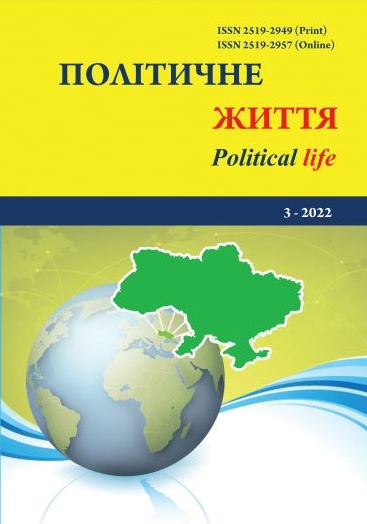The concept of a political process density and the possibility of its use in modeling political crises
DOI:
https://doi.org/10.31558/2519-2949.2022.3.6Keywords:
density of politics; modeling of the political process; forecasting of political crises; formal indicators of political developmentAbstract
The article is devoted to the presentation of the author’s concept of a density of political process and the explanation of some possible ways of its use to model the dynamics of modern political processes in the digital era. A system of indicators suitable for qualitative and quantitative measurement of the state of the political process is proposed, including the density of social relations, the share of political interactions in the total mass of social interactions, the number of translators of a political text, the translation of a political text and the relative number of political translators, the average density or "integrity" of political actors, the level of political responsibility of political actors. The definition of the indicators is proposed, and the peculiarities of their interrelationships are substantiated. It is substantiated that the central concept of the entire system of concepts is the notion of political volume, which is a multidimensional space limited by the borders of some state and political relations within it. It is substantiated that if the number of political subjects increases and the aggregate political responsibility remains at the previous level, the share of political responsibility of each of these subjects decreases. That is, the more political actors within a certain scope of political life, the less political responsibility of an individual actor. The fundamental possibility of using the proposed system of concepts to build a model of the political process to predict the onset of a political crisis is demonstrated. It was determined that at a moment of a political crisis would be a sharp increase in the number of political translators aimed at the state and state policy, that is, there is a sharp increase in the density of politics. And this sharp increase in the density of politics, in conditions of simultaneous increase in the number of actors, an increase in their level of irresponsibility and a great simplification of a content of political discourse, can serve as an indicator of the onset of a political crisis. The possibility of applying this system of concepts to model the dynamics of the political regime within the continuum "authoritarianism – democracy" is also demonstrated. It was determined that the quantitative assessment of the dynamics of politics’ density can be used as an indicator of the movement of the political regime towards democracy or, on the contrary, authoritarianism. An indicator of the movement of a regime towards democracy will be an increase in the density of politics, and evidence of a movement towards authoritarianism will be a "thinning of the political atmosphere" – that is, a decrease in the density of politics. According to our proposed model, an authoritarian regime is characterized by less density of politics than a democratic regime.
References
Monroe B., Schrodt P. Introduction to the Special Issue: The Statistical Analysis of Political Text. Political Analysis. 2008. 16. P. 351-355.
van Dijk J. A. G. M., Hacker K. L. Internet and Democracy in the Network Society. 2018. 226 p.
Shannon C. E., Weaver W. The Mathematical Theory of Communication. The University of Illinois Press, Urbana, Illinois, 1964. 125 p.
Baudrillard J. Simulacra and Simulation. University of Michigan Press, 1994. 161 p.
Rak J., Bäcker R. Neo-militant Democracies in Post-communist Member States of the European Union, London and New York, Routledge Taylor & Francis Group, 2022. 255 p.
Guasti P. The Impact of the Covid-19 Pandemic in Central and Eastern Europe: The Rise of Autocracy and Democratic Resilience.” Democratic Theory, 2020. 7(2). P. 47–60. https://doi.org/10.3167/dt.2020.070207
Rapeli L., Saikkonen I. How Will the COVID-19 Pandemic Affect Democracy?” Democratic Theory, 2020. 7 (2). P. 25–32. https://doi.org/10.3167/dt.2020.070204.
Steuer M. Militant Democracy and COVID-19: Protecting the Regime, Protecting Rights? Hong Kong Journal of Law and Public Affairs, 2020. 2. P. 131–145.

